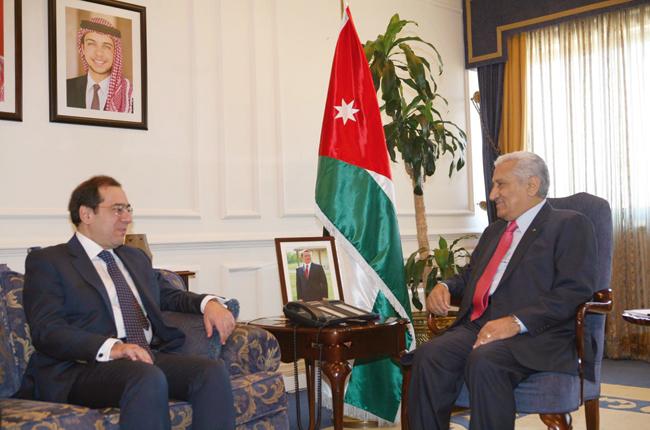You are here
Jordan, Egypt to activate energy cooperation, engage Iraq
By JT - Oct 02,2015 - Last updated at Oct 02,2015

Prime Minister Abdullah Ensour meets with Egyptian Minister of Petroleum and Mineral Resources Tarek El Molla in Amman on Thursday (Petra photo)
AMMAN — Prime Minister Abdullah Ensour and Egyptian Minister of Petroleum and Mineral Resources Tarek El Molla on Thursday discussed ways to enhance bilateral relations and cooperation, especially in the field of energy.
At the meeting, attended by Energy Minister Ibrahim Saif and Egyptian Ambassador to Jordan Khaled Tharwat, Ensour said Jordan stands by Egypt and will keep helping it face the challenges it is going through, the Jordan News Agency, Petra, reported.
After discovering the Zohr gas field in Egypt’s regional waters, Jordan hopes to increase cooperation in the field, stressing that the Kingdom has an interest in importing gas from the Arab country, the premier said.
Ensour predicted that there would be “big gas discoveries” in the region, resulting in competition among producers for consumer markets.
Both officials stressed the importance of electrical interconnectivity between the two countries, which is prone to enhance bilateral trade and attract large-scale investments.
Jordan used to rely on Egyptian gas, under a 15-year deal, for its electricity generation. However, a series of terrorist attacks targeting the pipeline in Sinai caused disruption in supplies and forced Jordan to rely on the costly heavy fuel and diesel.
They also highlighted the importance of the Iraqi oil pipeline, planned to be built between Basra in south Iraq and Aqaba, and said a Jordanian-Egyptian delegation is due to visit Baghdad to look into progress in the pipeline plans as well as the possibility of extending it to Egypt.
Also on Thursday, Saif and Tharwat met separately and agreed to activate the agreement signed by Jordan, Egypt, and Iraq on the matter, Petra reported.
The two sides also agreed to arrange a trilateral Jordanian-Egyptian-Iraqi meeting where stakeholders would discuss practical steps to facilitate the implementation of the agreement, which was signed in Amman in 2014.
Saif underlined the burden Jordan bears in regard to the energy bill and its effect on the state budget, which suffers a widening deficit, outlining plans under way to rely on alternatives and cheaper sources of energy, including gas imports from Egypt.
The Egyptian ambassador voiced his country’s respect to its contractual commitments to Jordan, noting that the development of the Zohr gas field ensures mutual benefits that will be embodied through signed agreements.
Related Articles
AMMAN — His Majesty King Abdullah on Sunday stressed the importance of establishing pan-Arab partnerships in energy projects in a way that a
AMMAN — Prime Minister Hani Mulki on Thursday discussed Jordanian-Egyptian energy cooperation with Egyptian Minister of Petroleum and Minera
AMMAN — Egyptian Ambassador to Jordan Khaled Tharwat, head of the Egyptian elections committee in Amman, said the run-off polls in Jordan ha
















